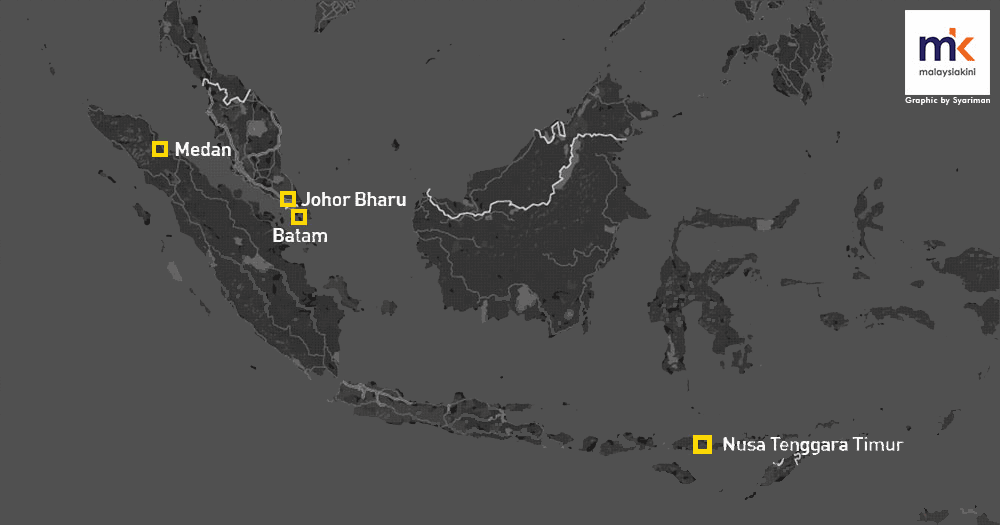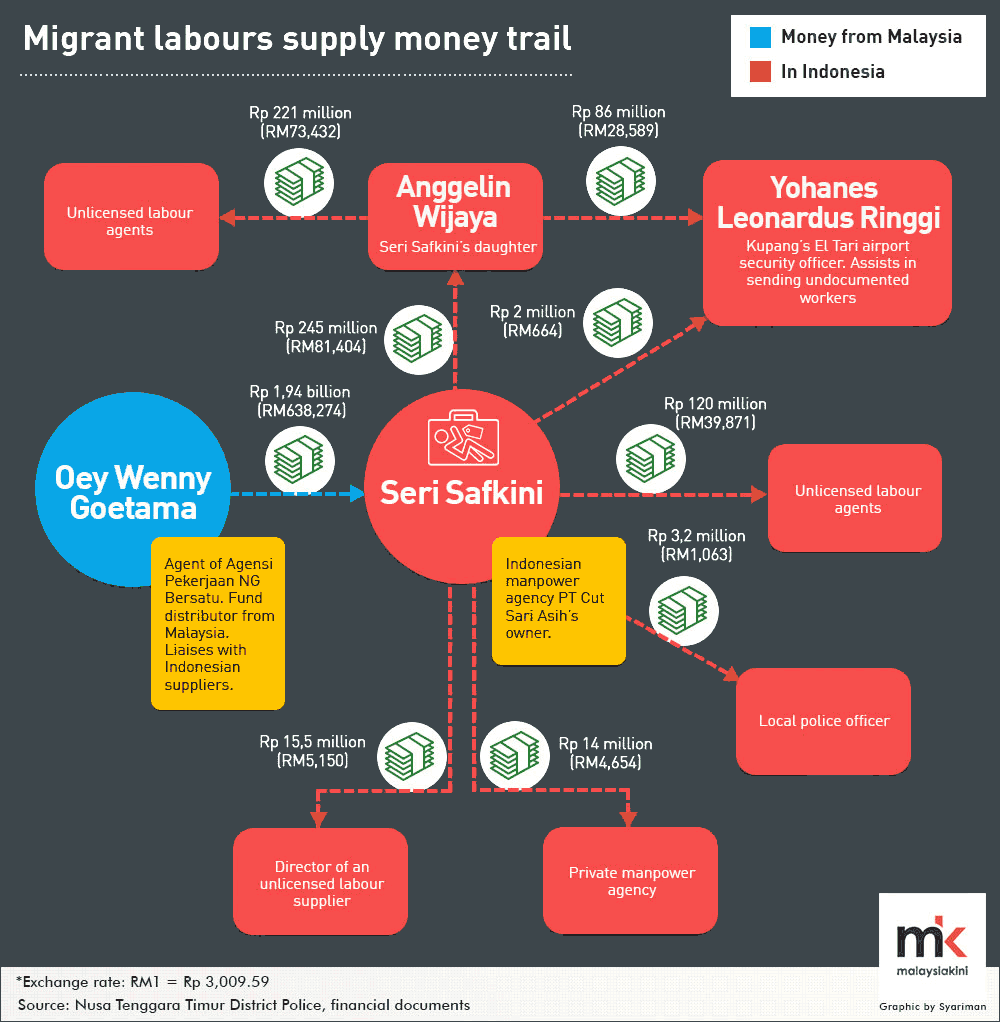Ten months after she ran away from home, Yufrinda Selan eventually returned a day before her 19th birthday. But it wasn’t tears of joy that greeted her.
Yufrinda’s family howled as her body, wrapped in a shroud, arrived in a white coffin at their hometown in Batu Putih, East Nusa Tenggara, Indonesia.
Her father, Mentusalak Selan, did not dare to open the wooden box as it bore another name – Melinda Sapay.

False document / PIX Gamaliel
“I was scared of making a mistake,” Mentusalak said when met earlier this month.
It was only after a provincial officer from Indonesia’s Migrant Workers Placement and Protection Body showed Yufrinda’s photo that Metusalak was willing to open the coffin. His daughter was inside.
Yufrinda was born on July 15, 1997. On her birthday last year, local police lifted the lid on her coffin, which was kept at a hospital mortuary.
Her family members identified her from a mole on her leg. But they were also shocked as there were stitches all over her body and bruises on her face.
“They said she hung herself and died at the home of her employer in Malaysia,” Mentusalak (photo) said.
Based on investigations by the police in Kupang, the provincial capital of East Nusa Tenggara, Yufrinda was recruited by a local human trafficking network that also involved experts in forging travel documents.
They identified former police officer Eduard Leneng and Diana Aman, who owned two private manpower agencies – PT Pancamanah Utama and PT Jaya Abadi – as individuals responsible for recruiting and sending Yufrinda to Malaysia.
Both of them were charged with various related offences earlier this month.
According to the charge sheet, Eduard was involved in forging Yufrinda’s documents, before she was handed over to Diana.
Met early last December, Eduard denied any involvement in human trafficking activities. “I have never dealt with the people who recruited Yufrinda,” he said.
Diana and her lawyer Edwin Manurung, on the other hand, reserved their comments. “For the meantime, no comments,” said Edwin.
Not the only maid to return as corpse
Yufrinda’s end is not an isolated case. Official Indonesian statistics from last year revealed that 33 migrant workers from the province returned home as corpses, including from Malaysia.
“Until today, trafficking of migrants from NTT to Malaysia is still rampant,” said Melki Musu, a coordinator for a local human trafficking watchdog.
East Nusa Tenggara is Indonesia’s southernmost province and most commonly referred to by the initials for its Indonesian name, Nusa Tenggara Timur or NTT.
Kupang district police chief Adjie Indra revealed that there have been more than 2,200 migrant workers from across NTT – spanning more than 500 islands across 48,718.1 square kilometres of land and sea – who have fallen victim to human trafficking syndicates over the last two years.
The figure was obtained from witness statements and suspects interrogated by the police. “There are at least seven human trafficking networks based in NTT,” Adjie said.
He noted that police have yet to crack down on all of the networks. “It will be done in stages,” he added.
According to Adjie, some of the human trafficking networks are funded by maid services and manpower agencies in Malaysia. “Their modus operandi is the same and it involves a big man in Malaysia.”
Money trail from Malaysia to Indonesia recruiters
Joint investigations into the human trafficking trail involving players in East Nusa Tenggara in Medan and Malaysia by Malaysiakini and Tempo started in September last year.
Their crossing paths could clearly be traced from records of their transactions between January 2015 and August last year. Almost as thick as a ream of paper, it details the flow of nearly RM1 million from Malaysia to NTT, meant for recruiting workers.
The largest transactions were from a woman named Oey Wenny Gotama.
For one year, from August 2015, records showed that Oey Wenny had transferred at least RM646,000, or nearly two million rupiah, to Seri Safkini, owner of PT Cut Sari Asih – an Indonesian recruitment agency based in Medan, Sumatera.
On June 28 last year, Oey Wenny transferred RM28,000, recorded as “deposit for five TKW”. TKW is the acronym for tenaga kerja wanita or female workers, while TKI refers to tenaga kerja Indonesia, meaning both male and female workers.
Seri Safkini then distributed the money to her contacts in NTT. One recipient was identified as Yohanes Leonardus Ringgi, a security officer at Kupang’s El Tari Airport. There were 155 transactions over a 12-month period beginning August 2015, amounting to RM600,000 according to present exchange rates.
Yohanes Ringgi was met on three separate occasions, while behind bars after his arrest last November, for alleged human trafficking offences. Reluctant to speak at first, he finally opened up on the human trafficking networks in NTT on the third meeting.
He admitted to receiving orders to recruit potential domestic helpers to be sent to Malaysia, from Eduard Leneng and Diana Aman, among others. Yohanes Ringgi also named Seri Safkini.
“They will send me money,” he said.
According to records of the transactions, the amount he received from Diana and Eduard was more than RM83,000.
Having worked as an airport security officer for 16 years, Yohanes Ringgi’s other duty was to ensure that potential workers would pass through all immigration checks. He admitted to have sent more than 400 workers to Malaysia from Medan and Surabaya. “For every one worker I will get 500,000 rupiah”.
Runaway teens enticed by making big bucks
Even children were not spared. Tempo met with Damaris Nifu and Jeni Maria Tekun, two underaged workers who Yohanes tried smuggle out. The duo were questioned by Kupang’s district police.
Both of them have received primary school education. They were not even 16 years old when first approached by Yanto and Mama Nona, two of Yohanes‘ underlings who were arrested sometime in mid-2015.
They ran away from home after being lured with a three million rupiah monthly salary – at a time when the local minimum wage was only 1.25 million rupiah. They were then kept at PT Cut Sari Asih’s office.
“We were harshly treated. Some were beaten and kicked,” recalled Jeni. Damaris and Jeni were later sent to Banda Acheh, but they eventually fled after being mistreated by their employers.
For children like Damaris and Jeni, their journey must start by creating a “new identity” – primarily to meet the legal employment age.
In Malaysia, a domestic helper candidate must be at least 21, while those employed in other sectors can be as young as 18.
Before departing for Medan, the two girls were furnished with forged identification cards.
All that was needed to do this was rudimentary graphic design skills and a computer equipped with Adobe Photoshop. The maker was a local university student named Sipri Talan who has connections with a number of labour recruiters.
“For every single fake KTP (identification card) I will get 100,000 rupiah (about RM30),” Sipri said when met in his detention cell at the Kupang district police station.
The new ID was then used to make their passports. The next step, according to Yohanes, would involve collusion with immigration officers in charge of issuing new passports.
The passport belonging to Yufrinda Selan, who died in Malaysia – issued under the name Melinda Sapay – was made by Godstar Mozes Banik, an immigration officer at Kupang’s El Tari airport.
This was according to the charge sheet against Eduard. Godstar, however, denied his role in abetting traffickers to produce the migrant workers’ passports. “Everything was done according to procedure,” he said.
Yufrinda’s case has been an important lesson for the Indonesian Immigration Department, the country’s Immigration director-general Ronny Franky Sompie said. “We will be more vigilant when dealing with passport applications,” he said.
M’sian employers paying double the set recruitment fee
Meanwhile, in Bandar Puchong Jaya, Selangor, a large yellow sign marks the entrance to the company NG Bersatu. The company’s name is written in capital letters and promotes its services as a “maid supplier”. There is an accompanying image of a woman in uniform while holding a toddler, both of them smiling.
The main office is located on the first floor. At the back of its spacious working area, there is a small room. A double-decker bed takes up most of the available space there. There is no window and only a fan.
The room is where Sarlin Agustina Djingib was taken to in August 2015, after she arrived in Malaysia. The migrant worker from East Nusa Tenggara was recruited by a human trafficking network involving Yohanes Ringgi.
At the time, she was still a teenager and below the legal employment age of 21. “All of my fake documents were made by Yohanes’ underlings,” Sarlin told police officers from Kupang, who recorded her statement at the Indonesian Embassy in Kuala Lumpur last December.
From her hometown in NTT, Sarlin was flown to Batam, an Indonesian province a short boat ride away from Johor. The journey of more than 3,800km would have taken her about seven hours, based on available flight details, including transit time in Surabaya or Jakarta. There is no direct flight between the two provinces.
In Batam, Sarlin was met by Angellin Wijaya, the daughter of Seri Safkini, owner of PT Cut Sari Asih. “Angellin sent me to the Batam Centre port to cross over into Johor Bahru,” she said.
An unidentified man then drove her the entire five-hour journey to NG Bersatu’s office in Puchong.
After staying one night in the room, Sarlin said she was picked up by her employer, Madam Jasmin. “I paid RM19,000 to NG Bersatu,” said Jasmin who accompanied Sarlin to the Indonesian Embassy in Kuala Lumpur.
The cost is more than double the RM8,400 recruitment fee agreed upon by both governments. And until today, Sarlin still does not have a valid work permit.
Click on the arrow below to follow Sarlin’s journey Malaysia in the interactive map below, or click here to view the map.
Malaysian recruiter unaware maids underaged
Kupang police also recorded Oey Wenny Goetama’s statement at the embassy, in connection with investigations into the human trafficking network that snared Sarlin.
Oey Wenny claimed to represent NG Bersatu. “I don’t know anything about human trafficking,” she said when met at the embassy last December, before rushing off. Oey Wenny also denied channelling funds for the recruitment of potential workers.
NG Bersatu’s manager, Ng Jing Hao, however contradicted Wenny.
“She handles our suppliers (Indonesian agencies). We pay her and she passes on the money to agencies in Indonesia,” Ng said when met at his office on March 15. However, he declined to reveal the exact amount that has been channelled to Indonesia.
Ng also insisted that he has never broken any Malaysian laws related to recruitment and placement of migrant workers. “We don’t take underaged workers. We go according to their passports.”
Ng said he wouldn’t know if any of them were underaged. “So far when they come into Malaysia through the immigration process, they all have no problems. Their fingerprints are all okay,” he said.
“If the maid is underaged, we don’t want them,” he stressed.
He admitted that NG Bersatu had a brief partnership with PT Cut Sari Asih “quite long” ago. But Sarlin was not one of the recruits.
“She came to Malaysia via another agent. We just helped her to find an employer,” said Ng who also admitted to taking a cut from Jasmin’s payment.
Repeated attempts to obtain a response from Seri Safkini and her daughter Angellin Wijaya were unsuccessful.
Their house (photo) at a high-end neighbourhood in West Jakarta appeared to be deserted. The local security guard later confirmed that both women were no longer staying in the house, which was also used as a shelter for recruited workers.
In Medan, another shelter that belonged to the Cut Sari Asih firm was similarly empty, after a raid by local police in August last year. The main gate to the two-storey house has been chained.
Seri Safkini is also a fugitive. According to Kupang district police chief Adjie Indra, the firm has sent at least 251 workers, who ended up as undocumented immigrants in Malaysia.
A young ‘Datuk’ businessman
Back in NTT, another former recruiter admitted to receiving funds from Malaysia. The recruiter, Kobar, admitted he once sent six workers to a Malaysian named Albert Tei. “For each worker, I received 21 million rupiah,” said Kobar who was once detained for human trafficking. Besides Kobar, two manpower agency managers from Indonesia, and several others from Malaysia, also identified Tei as a major recruiter of Indonesian migrant workers. Tei is the general manager of ManPower88, a consortium of eight maid agencies. The 29-year-old, who holds the Datuk title, is also the owner of Maxim Birdnest, a factory based in Klang. A labour attache at the Indonesian Embassy in Kuala Lumpur, Mustafa Kamal, revealed that he once questioned Tei on the number of workers he would bring in every month. According to Mustafa, Tei had admitted that he could “import” up to 100 Indonesian workers a month. “That is a very large number,” Mustafa added. By comparison, Malaysian National Association of Employment Agencies (Pikap) president Raja Zulkepley Dahalan said his members typically only recruit 20 workers a month. One of those brought to Malaysia from NTT is Seravina Dahu. Showed a picture of Tei, when met at her son’s home in Oesapa, Kupang, Seravina identified him as “my former boss”. Seravina, who is now a farmer, said that she never had a permit while working in Malaysia. “There were many others from NTT at Tei’s shelter, and the majority of them did not have proper documents,” she said. She also recounted how she often worked for more than 12 hours a day but was only given one meal: bread and plain water.
Met at his factory in Klang (photo), Tei vehemently denied claims of mistreatment and employing Indonesian workers illegally. “I only deal with legal (documented) workers,” he stressed. “If any of them came in using fake documents, I wouldn’t know because that is the responsibility of the agencies in Indonesia.”
Tei, who claimed to enjoy a close relationship with the police and immigration officers, also denied having recruited 100 workers a month.
“The most is 70 or 80 workers and that, too, during the time when Malaysia’s economy was still good. Now the most would only be 30 workers,” he said.
However, Tei admitted that he is known figure among labour recruiters in Indonesia.
“If in one month I recruit 50 workers, in two years that would be 1,200 workers. So it’s not a surprise if they mention my name back in their villages,” he pointed out.
In another conversation, he stressed he is unaware of irregularities in the recruitment process in Indonesia.
“We follow Malaysian law. So long as they have a valid passport and passed their medical check-up, we (Malaysian agencies) will process them (for placement). We don’t have the right to check whether their passports are fake or whatever,” Tei said.
All relevant documents, he explained, would also require endorsements from six parties – the Indonesian agency, Malaysian agency, the Indonesian Embassy in Kuala Lumpur, the Malaysian Labour Department, the maid and her employer.
Immigration collusion
There were some 1.2 million documented Indonesian workers in Malaysia as at the end of last year. But the Indonesian embassy’s labour attache estimates that the number of undocumented workers would be much higher. “The figure could be double,” Mustafa Kamal said.
Undocumented Indonesian workers work in plantations, restaurants and as sex workers. One of them, who introduced herself as Anggun from Jakarta, based her “operations” along Petaling Street. Anggun said a majority of the women working as sex workers in the area are Indonesians. “I have only been here a month,” she said.
Mustafa said both the Indonesian and Malaysian governments are facing difficulties to curb the flow of undocumented workers – and that one major factor is beyond their control. “There are some 150 hot spots along the countries’ borders that can be used as departure and entrance points for these workers,” he explained.
In Borneo, the land boundary has a length of 2,019.5km and separates the Indonesian provinces of North Kalimantan, East Kalimantan and West Kalimantan from Sabah and Sarawak. There is, however, only one official immigration point on either side – at Entikong in Indonesia and Tebedu in Malaysia.
The maritime boundaries between Indonesia and Malaysia, meanwhile, are located along four bodies of water – the Straits of Malacca, Straits of Singapore, South China Sea and Celebes Sea.
Collusion between authorities at official immigration counters has further compounded the problem.
At a popular nasi padang restaurant in Kuala Lumpur, two undocumented Indonesian workers – 28-year-old Ika Fatmawati and her cousin, 19-year-old Ines Nugraini – from Tangerang in Banten, West Java, shared how they arrived in Pasir Gudang, Johor, through Batam Centre port (photo) last Christmas.
“We were instructed to walk through counter Number 3. We were told that we would be ‘safe’,” said Ika.
Both of them only lasted two months working as cleaning service staff in Malacca. They never received their salary and were forbidden from leaving their hostel, unless they were heading to work. On Feb 22, they fled to Kuala Lumpur. “Now I feel free,” she said.
Johor Immigration director Rohaizi Bahari did not respond to requests for comment.
Ika’s fate is better than NTT native Yufrinda.
To this day, her father Mentusalak remains in the dark over his daughter’s real cause of death as there have been no investigations on allegations of assault. “I am convinced she was murdered,” he said.


Yufrinda’s employer, Conrad Wee, declined comment. “It was a very sad incident. I do not want to talk about it anymore,” Wee said, before driving out of his apartment building in Cheras (picture) where Yufrinda was said to have hung herself in the kitchen.
Inquiries with the police did not yield further information. When contacted, Bukit Aman’s D7 Division principal assistant director SAC Rohaimi Md Isa merely said the case was discussed by authorities from both countries on a bilateral platform.
“We have bilateral discussions with all neighbouring countries facing issues of human trafficking. It is for the purpose of facilitating investigations and enforcements,” Rohaimi said.
However, Indonesian Migrant Workers Protection Task Force chief in Malaysia, Yusron B Ambary, said a request has been made to local authorities to probe Yufrinda’s case. “Only the Malaysian police have the power to investigate,” he said.
In the meantime, Mentuselak Selan, Yufrinda’s father, continues to light a candle by his daughter’s grave – hoping for the spark that would reveal the truth.
Reporting by Stefanus Teguh Edi Pramono and Yohanes Seo from Tempo and Alyaa Alhadjri from Malaysiakini.
More
Two sides of a coin: Maritime and Modern Boutique
Finding the sweet spot between the fine lines that define a “dream home” can be rather tricky.
Cross-class marriage urged to tackle Indonesia poverty
JAKARTA: A senior Indonesian minister has suggested that poor people should marry someone of higher social status to reduce poverty.Muhadjir Effendy, the coordinating minister for human development and cultural affairs, told a meeting on the national health program in...
Silicon Valley inventor of ‘cut, copy and paste’ dies
San Francisco (AFP) - Silicon Valley on Wednesday was mourning a pioneering computer scientist whose accomplishments included inventing the widely relied on "cut, copy and paste" command.Bronx-born Lawrence "Larry" Tesler died this week at age 74, according to Xerox,...










